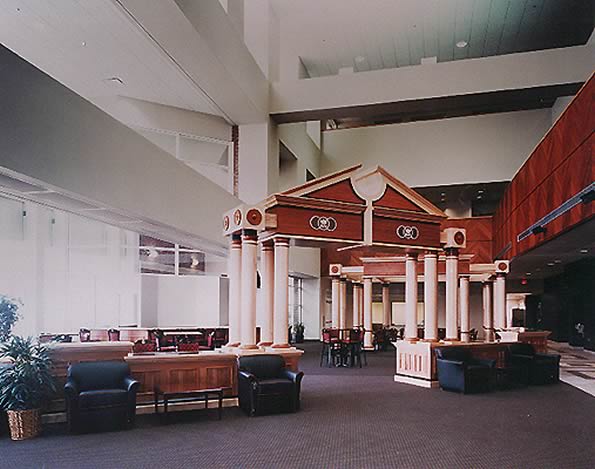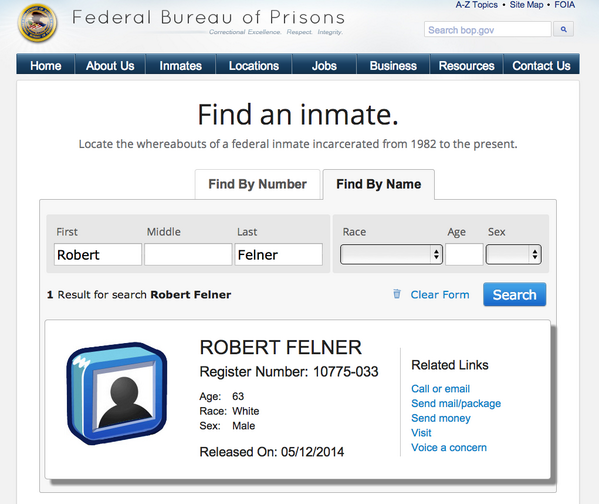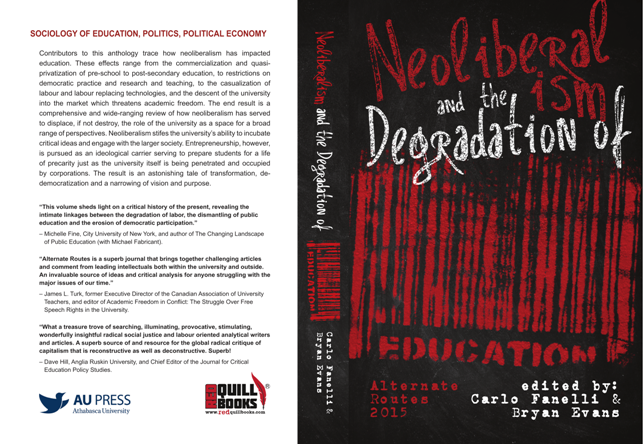Comments on Academic Freedom at the University of British Columbia
Delivered at “Breakfast with the Dean” panel April 21, 2016
E. Wayne Ross, PhD
Professor
Faculty of Education
University of British Columbia
First of all I would like to thank Dean Blye Frank for inviting me to participate on this panel and thanks to all of you for coming out this morning to participate in a discussion on academic freedom.
On the surface, it’s easy to be pro-academic freedom, kind of like being for mom and apple pie. But, academic freedom is a contested issue in universities (and schools, but that is a very different matter).
The Canadian Association of University Teachers (CAUT), describes a number of major academic freedom cases in Canada ranging from the University of Manitoba blocking a documentary film that reports findings of research on genetically modified crops; to irregularities that lead to the suspension of David F. Noble’s appointment to an endowed chair at Simon Fraser University; to Mary Bryson, the Faculty’s senior associate dean, and her battle with UBC over intellectual property rights. The arbitration decision in the Bryson case is described by CAUT as “landmark in the struggle to insure that faculty, not administrators, determine the content of courses.”[1]
In recent years there has been international attention given to the academic freedom cases of Professors Norman G. Finkelstein and Steven Salaita, who lost jobs as a result of social justice scholarship and activism, in particular, criticisms of Israel’s policies toward Palestinians living under occupation.
Threats to academic freedom are real and have a long history in Canadian postsecondary education and beyond.
CAUT defines academic freedom, in part, as including:
the right, without restriction by prescribed doctrine, to freedom to teach and discuss; freedom to carry out research and disseminate and publish the results thereof; freedom to produce and perform creative works; … freedom to express one’s opinion about the institution, its administration, and the system in which one works; … Academic freedom always entails freedom from institutional censorship.
Academic freedom does not require neutrality on the part of the individual. Academic freedom makes intellectual discourse, critique, and commitment possible.
Academic staff must not be hindered or impeded in exercising their civil rights as individuals including the right to contribute to social change through free expression of opinion on matters of public interest. Academic staff must not suffer any institutional penalties because of the exercise of such rights. [2]
In short academic freedom is essential to the mission of the university.
Dean Frank asked the members of this` panel to focus on issues of academic freedom in light of the current search to fill the new UBC position of Senior Advisor to the Provosts on Academic Freedom.
My first thought was that if we have provosts who need advisors on academic freedom, maybe they shouldn’t be provosts, really. But, perhaps I’m being too glib, even for a short breakfast talk.
Of course the creation of this new advisory position is the result of controversy created by the former chair of the UBC Board of Governors, John Montalbano, when he interfered with the academic freedom of Sauder School Professor Jennifer Berdahl, after she blogged about UBC President Arvind Gupta’s “resignation” after 13 months in office.[3]
Oh, wait a minute. Let me correct myself, like many of UBC’s self-investigation exercises the external report on the Berdahl case, written by former justice Lynn Smith, did not find fault with any individual university administrators.
“No individual intended to interfere with Dr. Berdahl’s academic freedom, or made a direct attempt to do so… However, sometimes several relatively small mistakes can lead to a failure of the larger system.”
Despite whatever good intentions might lurk behind the creation of the new academic freedom advisor position – and I do believe that its existence is primarily a public relations effort – at best this position is a band-aid on a life-threatening wound and at worse it is yet another diversion – a manifestation of an ideological stance that is widely held in society and practically hegemonic in universities—liberal neutrality. I’ll briefly address both of these circumstances.
Corporatization of the University (The life-threatening wound)
The corporate takeover of education at the K-12 and postsecondary levels, facilitated is by governments that might best be described as executive committees of the rich.
The trouble begins when the framework for understanding the nature and aims of education and scholarship is as a tool vital for economic success. As Thomas Docherty argues in his book Universities at War, the university has become a servant of the national and provincial economies in the context of globalization. Its driving principles of private and personal enrichment are understood as necessary conditions of progress and modernity.
Docherty sees this circumstances as a radical impoverishment of the university’s capacities to extend human possibilities and freedoms, to seek earnestly for social justice, and to participate in the endless need for the extension of democracy. Docherty argues that we must take sides in this matter because market fundamentalists are on the march and the war is being fought not just for scholars but also for a more democratic, more just, more emancipatory way of life.
The Problem of “Liberal neutrality”
In her article “Why I’m Not a Liberal,” Robin Marie Averback argues that
“In the liberal imagination, education and accommodation are self-evident solutions, since the problem can neither be understood as a matter of brute power struggles nor as a product of structural inequality fundamental to the functioning of entire institutions … You can’t choose a side when liberalism insists there are no sides at all.”[4]
This notion, helps to explain how the Smith Report on the Berdahl academic freedom case creates a victim without a victimizer. This is a pattern played out in numerous instances at UBC in recently. See, for example, the reports on:
- the privacy breach related to documents on the Arvind Gupta imbroglio[5]
- Commerce Undergraduate Society Frosh Week “rape chants”[6]
- UBC handling of sexual assault complaints[7]
Averback reminds us of the picture book version of social justice that we often see on walls of community centres,
“In this picture book version of social justice struggle, no one ever opposes freedom’s forward march. All the oppressed need to do is rise up and assert themselves; the world they are fighting for is realized simply by the act of self-declaration.”
At UBC everybody seems to be for academic freedom. It’s like a picture book version of academic freedom. But in the all-administrative university – a phrase coined by Benjamin Ginsberg in his book The Fall of the Faculty – the response of the administration to an academic freedom crisis is the creation of yet another administrative position, aimed at educating and accommodating.
This reminds me of a comment someone made in the context of the recent UBC Board of Governors debacle(s) and the compromised Presidential Search Committee, “UBC doesn’t need a new driver, because the problem is with the car.”
Here are some academic freedom issues that the new position will like never come close to addressing:
- Intellectual property rights;
- Corporate influence on campus academic programs and research.[8]
- Faculty loss of control over academic programs (such as the teacher education program in our faculty)
- Respectful workplace statements that become instruments that encourage bullying and mobbing of faculty with dissenting points of view or who merely ask questions that make people uncomfortable;
- Middle managers, like those in Sauder, who intervene like their corporate counterparts to threaten the rank and file on issues of solidarity and criticism of management (e.g., the recent UBCFA no confidence vote);
- People like those faculty members who have warned UBC Professor Jonathan Ichikawa (sponsor of the UBCFA no-confidence vote in the Board of Governors) that his activism would negatively affect his advancement at the university;
- Students/faculty self-funding themselves;
- Administrative efforts to “right-size” academic programs;
- Tenure and promotion committees that forego evaluative reading of faculty scholarship and instead focus on impact factors or the amount of external dollars won in competitions.
When no one is understood as protecting a position of power (liberal neutrality) how do we combat these threats to academic freedom? I don’t think the answer is by appointing an advisor to the provost.
Questions for discussion:
To what degree are the new policies for academic speech inscribed in academic work, regardless of where it’s done? As the academic workplace is increasingly displaced and distributed, are academic policies displaced and distributed as well? Observed at work, monitored at home and tracked in between—these are not so much choices as the cold reality of 21st century academic work.[9]
BC Premier Christy Clark has warned provincial postsecondary institutions that they must do a better job of producing graduates who meet the needs of the private sector (2014 Throne Speech). What happens to academic freedom when universities are cast as servants to the provincial or national “economic success?”
Notes
[1] CAUT, Major Academic Freedom Cases: http://www.caut.ca/issues-and-campaigns/academic-freedom/academic-freedom-cases
[2] See full CAUT statement on academic freedom here: https://www.caut.ca/about-us/caut-policy/lists/caut-policy-statements/policy-statement-on-academic-freedom – sthash.0grFSra5.dpuf
[3] http://www.cbc.ca/news/canada/british-columbia/ubc-chair-john-montalbano-resigns-after-report-finds-academic-freedom-not-protected-1.3272776
[4] https://www.jacobinmag.com/2014/07/why-im-not-a-liberal/
[5] http://universitycounsel.ubc.ca/files/2016/03/D-Loukidelis-Report-on-UBC-FOI-Processes-final-7-Mar-16.pdf
[6] http://president.ubc.ca/files/2013/09/Fact-Finding-Report-copy.pdf
[7] http://www.cbc.ca/news/canada/ubc-sexual-assaults-complaints-expulsion-1.3328368
[8] See government appointments to UBC Board and U of Calgary/Enbridge relationship: http://www.cbc.ca/beta/news/canada/calgary/caut-ucalgary-uofc-dru-marshall-david-robinson-1.3531851
[9] See Petrina, Ross, & Mathison (2015). Threat convergence: The new academic work, bullying, mobbing and freedom. Workplace: A Journal for Academic Labor, 24, 58-69. Retrieved from http://ices.library.ubc.ca/index.php/workplace/article/view/186137/185332
 Follow
Follow







